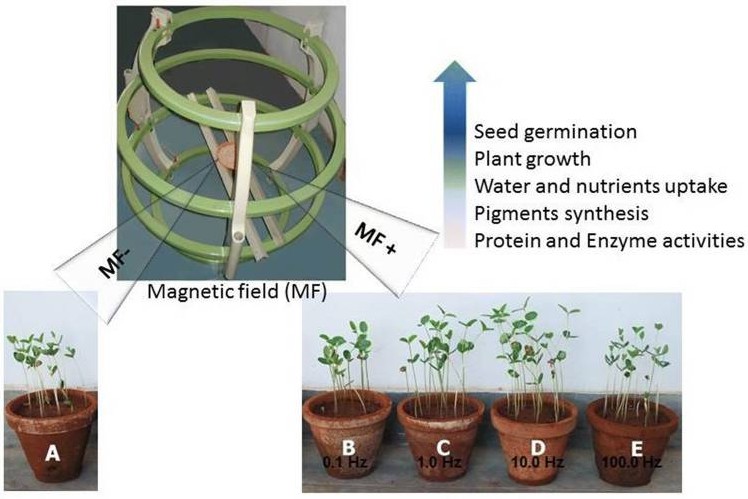Magnetic field (MF) is an unavoidable environmental factor for plants on earth. During evolution, all living organisms have experienced the action of the Earth's magnetic field (GMF), which has a tremendous impact on crop productivity. Specifically, electromagnetic radiation from the sun stimulates plant growth and development through photosynthesis. Another possibility for promoting plant growth may be to alter the electrostatic balance of the plant system at the cell membrane level, as it is a significant factor in plant growth. GMF can affect basic biological functions such as rhythmicity, orientation, and development.
Currently, global climate fluctuations and population growth are causing a decline in crop productivity. Plant productivity can be improved by applying plant growth promoters, soil microbial inoculation, organic and inorganic fertilizers, and several other non-conventional methods such as plant breeding and genetic engineering. Magnetic field therapy in plants and animals is an effective and emerging tool to control diseases and increase tolerance to unfavorable environments.
 Fig. 1. Effect of magnetic field on functional changes in plants for their growth improvement. (Radhakrishnan R, 2019)
Fig. 1. Effect of magnetic field on functional changes in plants for their growth improvement. (Radhakrishnan R, 2019)
Our breeders are very interested in the use of MF in agricultural science and are committed to studying magnetic fields to transform traditional plant production systems, including improving average germination rates and root and shoot growth, increasing productivity, increasing photosynthetic pigment levels, enhancing cell division and water and nutrient uptake, preventing pests and diseases, and reducing stressful conditions. Lifeasible offers comprehensive solutions to analyze the effects of magnetic fields on seed germination, biochemistry, hormonal changes, plant growth, development, and evolution. We aim to help you better understand the interactions between MFs and plant responses to revolutionize crop production and increase crop yields.
We offer eco-friendly methods to treat plants, such as gamma rays, lasers, electron beams, microwaves, medium frequency, and radio frequency energy, to produce biostimulation of plants. We analyze the impact of magnetic fields on plant growth, development, and evolution by studying the following aspects.
Lifeasible recognizes that each project has unique challenges and goals, providing tailored solutions to analyze MF effects on plant growth and development. Current knowledge and prospects of MF-based induced changes in plant physiology to enhance growth and yield under favorable and unfavorable conditions. Contact us today to learn more about our services.
Reference
Lifeasible has established a one-stop service platform for plants. In addition to obtaining customized solutions for plant genetic engineering, customers can also conduct follow-up analysis and research on plants through our analysis platform. The analytical services we provide include but are not limited to the following:
STU-CRISPR System Improves Plant Genome Editing Efficiency
April 19, 2024
Application of Exosomes in Facial Beauty
April 12, 2024